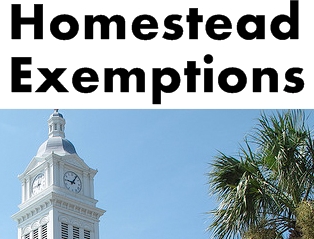Submitted by Suanne Z. Thamm
Reporter – News Analyst
July 6, 2016 1:00 a.m.
Those lazy, hazy days of summer are upon us, and many visitors have already descended upon our island. Renting out houses on the beach for a week or two may sound like a great way for homeowners to pick up a little extra income. Of course, putting any resort residential property up for rent in the city requires a permit. Failure to obtain a permit can result in a hefty fine. But that could be a minor problem in comparison to the possibility of losing all or part of your homestead exemption for that property.
 What is the “Homestead Exemption?”
What is the “Homestead Exemption?”
In 1933 the state of Florida passed the first Homestead Exemption Amendment as a means to help homeowners keep their homes during the Great Depression. Incorporated by referendum into the state Constitution, over the years the exemption has risen from $5,000 to $50,000. Today the Florida property tax homestead exemption reduces the value of a home for assessment of property taxes by $50,000, so a home that was actually worth $100,000 would be taxed as though it was worth only $50,000.
There are other benefits as well. The 1992 amendment, which went into effect in 1995 caps the increase of the assessed value of a home with a homestead exemption to the lesser of 3% or the rate of inflation. This means that if an owner had a homestead exemption on a home valued at $100,000 in 1995, and the exemption was still valid in 2005, the most the home could be assessed at is approximately $126,000.
Homestead exemptions are only available on an individual’s primary home. Therefore, this exemption does not apply to businesses, rental property, second homes, homeowners claiming permanent residency-based exemptions or tax credits in other states, or homes with owners that do not claim Florida as their primary residence. Because of the “portability” provision of the January 2008 constitutional amendment, a homesteaded owner may now move up to $500,000 of the “Save Our Homes” benefit from one Florida home to the next. However, acquiring a house that had a homestead exemption does not entitle the buyer to retain the low tax rate enjoyed by the previous homesteaded resident, as homestead exemptions cannot be inherited or purchased.
Penalties for violating laws governing Homestead Exemptions
Because the increase in the Homestead Exemption has dramatically reduced the amount of property tax available for local government, Florida counties take enforcement of rules governing homestead exemptions very seriously. Florida Statute states:
- 196.011(9)(a) … “It is the duty of the owner of any property granted an exemption, who is not required to file an annual application or statement, to notify the property appraiser promptly whenever the use of the property or the status or condition of the owner changes so as to change the exempt status of the property”…
Failure to notify the Property Appraiser’s Office when property no longer qualifies for exemption could result in a Homestead Tax Lien with substantial penalty and interest. Such failure could constitute Homestead fraud.
 Homestead fraud occurs when a person who has filed for homestead exemption or is currently receiving homestead exemption is determined not to be a permanent resident of Nassau County, or who is not in good faith residing on the property on which he or she filed.
Florida Statute 196.131(2) provides that “any person who knowingly and willfully gives false information for the purpose of claiming homestead exemption is guilty of a misdemeanor of the first degree, punishable by a term of imprisonment not exceeding 1 year or a fine not exceeding $5,000 or both.”
Homestead fraud occurs when a person who has filed for homestead exemption or is currently receiving homestead exemption is determined not to be a permanent resident of Nassau County, or who is not in good faith residing on the property on which he or she filed.
Florida Statute 196.131(2) provides that “any person who knowingly and willfully gives false information for the purpose of claiming homestead exemption is guilty of a misdemeanor of the first degree, punishable by a term of imprisonment not exceeding 1 year or a fine not exceeding $5,000 or both.”
Florida law also states that if it is determined that you have had homestead exemption in the past to which you were not entitled, a lien is placed against your property for the amount of the exemption, plus 50% penalty, plus 15% interest per for each year during which the exemption was fraudulent. Statutes allow the lien to be placed retroactively for up to 10 years.

Mike Hickox, the Nassau County Property Appraiser, has a section of his website dealing with fraud (http://www.nassauflpa.com/Exemptions/Homestead-Fraud).
There is a link on the website to enable people to report possible homestead exemption fraud confidentially. Reports are reviewed and investigated by office staff.
Permitted rental of homesteaded property
For brief periods, you may rent homestead property without running afoul of state law. You may rent your homesteaded property for 30 days or less per calendar year and maintain a homestead exemption. Rental for more than 30 days for two consecutive years or for more than six months constitutes abandonment of a homestead exemption. Exempt property rented after January 1 of any year does not affect the homestead exemption for that particular year. If the property is rented on January 1 of the following year or the terms of the lease are six months or more the exemption will be denied.
If you are a member of the armed forces on active military duty, you are permitted to rent your home, but you must notify the office in advance and provide your military orders.
All the terms listed above and outlined in law apply to all county homesteaded property, regardless of where it is located. But the City of Fernandina Beach has some additional rules – and penalties for scofflaws – regarding short-term resort rentals.
 Fernandina Beach Resort Rental rules
Fernandina Beach Resort Rental rules
Section 26-101 of the city’s municipal code addresses permitting and reporting requirements for what are commonly termed, “short term rentals.” These rules apply to residentially zoned property, whether homesteaded or not:
City Code: Section 26-101
(a) It shall be unlawful for the owner of any dwelling unit in the city to permit the occupancy of any dwelling unit for resort rental dwelling purposes, unless such occupancy has been authorized by the issuance of a resort rental dwelling permit (RRDP) as provided herein. “Resort rental dwelling” or “resort rental residential” shall be as defined in sections 1.07.00 and 4.02.05 of the city’s land development code and which are limited to occupancy periods per rental of less than 30 days.
 (h)(2) A first violation of the RRDP requirements (not having a valid permit) of this section within any 12-month period shall be punishable by a citation and fine of $1,000.00. … If more than one violation of this section (permitting requirements) or any other City Code provision including but not limited to noise, outdoor lighting during turtle nesting season, nuisance or garbage violations occur in any 12-month period, the owner of the resort rental dwelling property shall be notified in writing of the violation, and the city shall proceed to prosecute the violation through the code enforcement board process …. If the code enforcement board finds a violation, the owner may be fined up to $250.00 per day and lien(s) may be placed on the owner’s property.
(h)(2) A first violation of the RRDP requirements (not having a valid permit) of this section within any 12-month period shall be punishable by a citation and fine of $1,000.00. … If more than one violation of this section (permitting requirements) or any other City Code provision including but not limited to noise, outdoor lighting during turtle nesting season, nuisance or garbage violations occur in any 12-month period, the owner of the resort rental dwelling property shall be notified in writing of the violation, and the city shall proceed to prosecute the violation through the code enforcement board process …. If the code enforcement board finds a violation, the owner may be fined up to $250.00 per day and lien(s) may be placed on the owner’s property.

When Fernandina Beach first enacted its rules governing permit requirements for resort rental property, all property owners were notified. Unfortunately, not all property owners have chosen to comply. In some instances, homeowners have opted to rent out their properties via various websites in the hope that this would allow them to fly under the radar of City Code Enforcement.
What scofflaws may not have realized, however, is that the city and the Property Appraiser share information. As violations come to light, property owners could end up facing city fines as well as possible loss of homestead exemption and resulting penalties levied by the Property Appraiser.
So before you decide to rent your house on South Fletcher on Craig’s List or let someone rent out your garage apartment or that unused bedroom, make sure you do your homework. The income you receive from such transactions might not be enough to cover your fines and penalties if you violate the rules.
On the Property Appraiser’s website, Hickox advises citizens that he investigates homestead fraud very aggressively. He states, “The penalties are very stiff, but it is important to know that anyone who claims an exemption to which he or she is not entitled, forces the rest of the Nassau County taxpayers to make up the difference in their tax bills. Fraudulent homestead exemptions steal from our law enforcement, our schools, our quality of life and from each and every citizen of this county.”
Save yourself the hassle and the money of contesting fines and penalties assessed by the state or the city by learning what the laws require. There is a wealth of information on the Homestead Exemption on the Property Appraiser’s website www.nassauflpa.com. For answers to questions about resort rentals in the City of Fernandina Beach, contact the Planning Department (904) 310-3135 or Code Enforcement at (904) 310-3146.
 Editor’s Note: Suanne Z. Thamm is a native of Chautauqua County, NY, who moved to Fernandina Beach from Alexandria,VA, in 1994. As a long time city resident and city watcher, she provides interesting insight into the many issues that impact our city. We are grateful for Suanne’s many contributions to the Fernandina Observer.
Editor’s Note: Suanne Z. Thamm is a native of Chautauqua County, NY, who moved to Fernandina Beach from Alexandria,VA, in 1994. As a long time city resident and city watcher, she provides interesting insight into the many issues that impact our city. We are grateful for Suanne’s many contributions to the Fernandina Observer.

Thanks for the reminder. I know that Code Enforcement has plenty on their plate with other issues but it seems that the monitoring of short-term rentals is inconsistent. While they may have a permit, I often see FB rentals on VRBO or airbnb that don’t display their permit number as required by the ordinance. Probably the risk of losing the homestead is more likely on airbnb where they are renting out a bedroom, but the fines are significant and will force compliance.